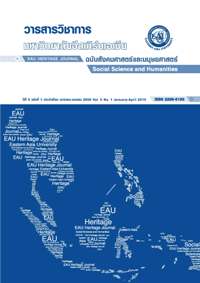ยุทธศาสตร์การจัดการศึกษาเพื่อพัฒนาคุณลักษณะที่พึงประสงค์ ตามแนวคิดปรัชญาของเศรษฐกิจพอเพียงสำหรับนักศึกษานอกระบบ และการศึกษาตามอัธยาศัยในภาคตะวันออกของประเทศไทย
Keywords:
ปรัชญาของเศรษฐกิจพอเพียง, ยุทธศาสตร์, การจัดการศึกษานอกระบบ, economy, strategy, ThailandAbstract
การวิจัยนี้ศึกษายุทธศาสตร์การจัดการศึกษาเพื่อพัฒนาคุณลักษณะที่พึงประสงค์ตามแนวคิดปรัชญาของ เศรษฐกิจพอเพียง และทดลองใช้กับนักศึกษานอกระบบของศูนย์การเรียนรู้ชุมชนบ้านศรีนาวา จำนวน 40 คน ใช้วิธี การวิจัยแบบผสมผสาน โดยใช้แบบสอบถามและการเสวนากลุ่มย่อย ผลการวิจัยพบว่า ยุทธศาสตร์การจัดการศึกษา เพื่อพัฒนาคุณลักษณะที่พึงประสงค์ได้ 4 ยุทธศาสตร์ ประกอบด้วย (1) การส่งเสริมสนับสนุนให้เกิดการปฏิบัติอย่าง จริงจัง (2) การพัฒนากระบวนการคิดเป็นอย่างต่อเนื่อง (3) การจัดและส่งเสริมกระบวนการเรียนรู้ที่หลากหลาย และ (4) การพัฒนาทักษะการแสวงหาความรู้ แต่ละยุทธศาสตร์พบว่า การปฏิบัติของนักศึกษาก่อนได้รับความรู้ ปฏิบัติอยู่ในระดับปานกลาง หลังได้รับความรู้ มีการปฏิบัติอยู่ในระดับมาก เมื่อพิจารณาเปรียบเทียบก่อนและหลัง ได้รับความรู้ พบว่า พฤติกรรมของนักศึกษามีการออมทรัพย์ในรูปแบบต่างๆ ก่อนได้รับความรู้ และมีการปฏิบัติ อยู่ในระดับปานกลาง เมื่อได้รับความรู้ ปฏิบัติอยู่ในระดับมากที่สุด ผลการทดลองใช้ยุทธศาสตร์การจัดการศึกษา เพื่อพัฒนาคุณลักษณะที่พึงประสงค์พบว่า พฤติกรรมของนักศึกษา กศน. แสดงให้เห็นว่า หลังจากได้รับความรู้ แล้วนักศึกษาสามารถนำความรู้ไปปฏิบัติในชีวิตประจำวันได้จริงและสามารถนำไปใช้ให้เกิดประโยชน์ต่อตนเอง ครอบครัวและชุมชนได้อีก
Education Management Strategies for Developing the Desirable Characteristic of Students According to the concept of Sufficiency Economy Philosophy for Non-Formal and Informal Education in the Eastern Region of Thailand
This research study aimed to develop desirable characteristic traits of students in line with the Sufficiency Economy Philosophy for non-formal and informal education in the eastern region of Thailand. The study was undertaken through a try out on a strategic model for educational development of desirable characteristic traits comprising of 4 strategies as follows: (1) promoting skills and abilities of the students before providing knowledge, (2) development of continuing process of thinking, (3) promoting varieties of learning process and, (4) promoting development of knowledge skills among students. The research results provided the basis in analyzing the attitudes of students in non-formal and informal education. It showed that subsequent to the achievement of knowledge by the students, the resulting skills acquired were applied in their daily lives. Moreover, the 22 characteristic traits developed by the sampling group were beneficial not only to the students themselves but also to their families and their communities as a whole.





